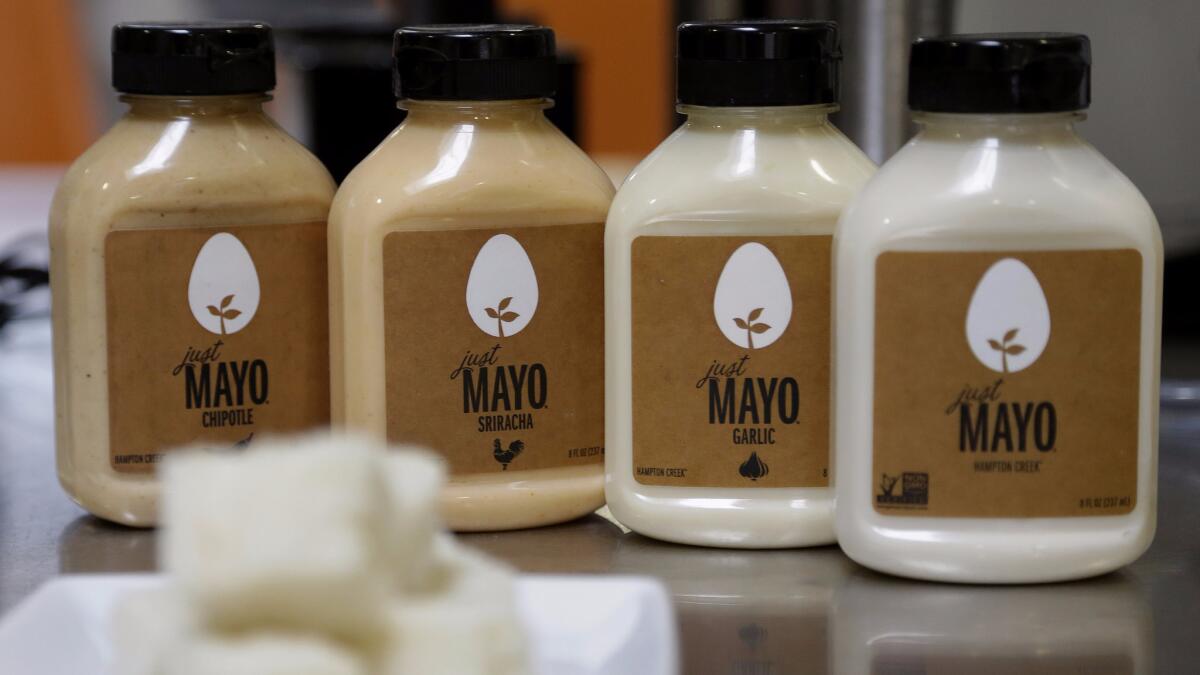The egg industry launched a secret two-year war against a vegan mayonnaise competitor

With its egg-free recipe, Just Mayo had become a darling of vegans, a hot investment for Silicon Valley venture capitalists and an avatar for alternatives to industrial agriculture.
But to the nation’s $7-billion egg industry, Just Mayo posed an existential crisis so serious that a federally supervised trade group launched a secret two-year campaign to thwart the San Francisco start-up that makes it.
The campaign against Beyond Eggs, the original name of company behind Just Mayo, included flirting with an offer from a consultant who bragged he could rid the product from Whole Foods’ shelves “with one phone call,” and jokes among American Egg Board members and affiliates about “pooling our money to put a hit” on the company’s founder, emails show.
The investigation, sparked by documents obtained through the Freedom of Information Act by a Massachusetts Institute of Technology researcher and his Washington attorney, reveals the lengths the American Egg Board appeared willing to go to crush Just Mayo, its manufacturer, now called Hampton Creek, and the firm’s founder, Josh Tetrick.
Federal investigators did not find the campaign amusing, slamming the American Egg Board for overstepping its congressional mandate and chiding its overseers at the U.S. Department of Agriculture in a lengthy investigation that was quietly released on the agency’s Freedom of Information library page late Thursday.
The American Egg Board, an industry-funded promotion group overseen by the U.S. Department of Agriculture’s marketing branch, spent at least $59,500 to counter the product’s publicity advances.
It hired a top-tier Chicago public relations firm to plant “USDA approved” pro-egg messaging with bloggers the firm considered “influential,” according to investigation documents. And it deployed pop-up ads promoting eggs — usually with the board’s “Incredible Edible Egg” logo — that would outrank, replace or obscure other content when Internet users searched such terms as “Beyond Eggs,” “Hampton Creek,” “Just Mayo” or “Josh Tetrick,” according to an internal review by the Agriculture Department.
Email exchanges among egg board members and affiliate groups asked “Can we pool our money and put a hit on him?” and suggested having “old buddies from Brooklyn pay him a visit,” referring to Tetrick.
The parties involved in the exchange told investigators they were just joking, and investigators concluded the messages were written in jest.
But the activities appear to have pushed American Egg Board Chief Executive Joanne Ivy into early retirement last year, according to the investigation documents.
Ivy refused to respond to a subpoena by USDA investigators, investigators said. She “entered into a Confidential Severance Agreement and Release with AEB and retired from her position” in September 2015, a few months before the end of her tenure, investigators said.
She and board officials involved in the allegations could not be contacted for comment.
Blair Van Zetten, the current chairman of the egg board, said the group cooperated fully with the investigation. “There were no findings of violation” of the congressional act that created the board or the law that governs how it collects funds and operates, he said.
Investigators found that the board’s monitoring of a specific company and product and its attempt to undermine them were inappropriate and exceeded the 1976 bylaws that govern the 18-member board, which is appointed by the secretary of Agriculture and uses the $20 million in annual fees it collects from large-scale producers to support research and promote the egg industry.
Ivy approved of an offer from Anthony Zolezzi, identified as a consultant and serial entrepreneur, who bragged during a strategy session in Chicago in 2013 that he could make “one phone call” and get Whole Foods to pull the product from its shelves.
“If it is that easy, I will contact Anthony and remind him to make that call if it isn’t too steep” in cost, Ivy wrote to Chad Gregory, president and chief executive of United Egg Producers, a board-affiliated cooperative of egg producers.
An executive for Whole Foods told investigators that no such attempt was made, and investigators found no other evidence the plan was executed after it was proposed and supported by Ivy in 2013.
Zolezzi, who later apologized to Tetrick for his role, never was under contract with the board, the investigation concluded.
Investigators from the USDA’s Agricultural Marketing Service said these exchanges were “inappropriate discussions about an action that, if acted upon, would have significantly exceeded the provisions of the Egg Research and Consumer Information Act” that established the board and its duties.
Ivy also instructed staff to erase all emails having to do with Beyond Eggs after reading them. Staff did not erase them, but Ivy apparently did, according to investigators, who retrieved the deleted communication.
The board paid a Chicago-based public relations firm, Edelman Inc., to monitor every story about the company and to encourage bloggers and writers to tout the benefits of eggs.
In an email to Edelman employees and egg board staff in 2013, under the subject “Beyond Eggs,” Ivy suggested that “it would be a good idea if Edelman looked at this product as a crisis and major threat to the future of the egg production business.”
The public relations firm, which specializes in the food and beverage industry and has an annual revenue of $855 million, told the board that it had compiled “key messages (USDA approved) to ask our Beyond Eggs bloggers (full list below) to weave into their blog posts.”
Edelman estimated that it would cost $33,000 for “research and coordination with 5-10 key influential bloggers in food and health/nutrition space, drafting key messaging and coordinating posts,” according to the board documents.
Investigators found no evidence that the bloggers, who acknowledged egg board sponsorship, wrote disparagingly of Hampton Creek or its products.
Edelman no longer has a contract with the board, according to the documents.
Investigators found no evidence to support allegations by Tetrick that the board intervened in a lawsuit by food giant Unilever that unsuccessfully challenged Hampton Creek’s use of the word “mayo” to describe its egg-free product.
The egg board campaign came amid what was at first sympathetic coverage of a small company going up against the conglomerate that makes Hellmann’s mayonnaise.
Beyond Eggs won customers and attention by taking aim at the industrialized food chain, its chemically enhanced production practices and its treatment of animals.
But that public image soon tarnished. More critical looks at company practices revealed that Hampton Creek hired contractors to buy back its products from grocery shelves, which could create false sales figures. Tetrick said the moves were part of quality control testing. The revelation, published by Bloomberg, nonetheless sparked an investigation by the Securities and Exchange Commission and Justice Department.
Hampton also jousted with the Food and Drug Administration, which monitors claims and labeling of food products, and was concerned whether “Just Mayo” described a true mayonnaise, which has egg in its recipe.
Hampton Creek eventually had to make several alterations of its label, including defining what it meant by the word “just.”
Tetrick told the USDA that the egg board tried to influence the FDA inquiry, but the investigator could not confirm the allegation.
Emails show that an official with the USDA’s marketing service did suggest forwarding the board’s concerns about labeling to the FDA. Ivy replied, “Okay. Let’s do it,” but expressed unspecified “concerns” that needed further discussion.
Ivy also told a United Egg Producers member that, while the FDA probably knew of about the industry’s labeling concern, “maybe it needs to be pushed.”
Some activities within the Beyond Eggs campaign were acceptable, investigators concluded — such as the board’s financial support of research comparing the environmental footprint of egg substitutes with those of eggs. But specifying one company and product in its internal budgeting documents, which were not properly submitted for USDA review, violated federal guidelines, the investigation concluded.
The board “acted inappropriately by failing to obtain [USDA Agricultural Marketing Service] approval for specific budget allocations and the related project activities,” the investigation found.
Penalties for the behavior were mostly confined to additional training in ethics and procedures.
A USDA spokesman on Friday noted that the inquiry into the egg board was an administrative review, not a criminal investigation.
The department’s marketing service branch “takes these findings very seriously and has begun immediate corrective actions to ensure the integrity of the AEB and other similar boards under USDA oversight,” he said.
New procedures for removing board members are being rewritten, he added.
Follow me: @LATgeoffmohan
ALSO
L.A. County plans to make hospitals report superbug infections
To keep drones out of high-risk areas, companies try hijacking them and shooting them down
Column: The deceptive campaign against Prop. 56 comes from the tobacco industry’s old playbook
UPDATES:
2:15 p.m.: This article was updated with additional reporting.
This article was originally published at 4:55 a.m.
More to Read
Inside the business of entertainment
The Wide Shot brings you news, analysis and insights on everything from streaming wars to production — and what it all means for the future.
You may occasionally receive promotional content from the Los Angeles Times.











